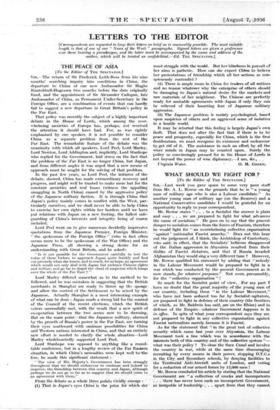THE PEACE OF ASIA
LETTERS TO THE EDITOR . [Correspondents are requested to keep their letters as brief as is reasonably possible. The most. suitable length is that of one of our " News of the Week" paragraphs. Signed tellers are given a preference over those bearing a pseuckmyni; and the latter must be accompanied. by the name and address of the author, which will be treated as confidditial.—Ed. THE SPECTATOR.].
- [To the Editor of THE SPECTATOR.] ' Sin,—The return of Sir Frederick Leith-Ross from hiS -nine
months' searching inquiry into conditions in China, the departure to China of our new Ambassador Sir Hughe • Knatchbull-Hugessen two months before the date originally fixed, and the appointment of Sir Alexander Cadogan, late Ambassador of China, as Permanent Under-Secretary in the Foreign Office, are a combination of events that can hardly fail to suggest a new departure in Great Britain's policy in the Far East.
That policy was recently the subject of a highly important debate in the House of Lords, which among the over- whelming anxieties of Europe has, perhaps, not received the attention it should have had. For, as was rightly emphasised by one speaker, it is not possible to consider China as a separate problem from the rest of the Far East. The remarkable feature of the debate was the Unanimity with which all speakers, Lord Peel, Lord Marley, Lord Newton, Lord Addington and, implicitly, Lord Stanhope who replied for the Government, laid stress on the , fact that the problem of the Far East is no longer China, but Japan, and from different angles it was urged that a new means of approach must be sought for the solving of that problem.
In the past few years, as Lord Peel, the initiator of the debate, showed, China has made extraordinary recovery and progress, and might well be trusted to make more but for the constant anxieties and real losses . (witness the appalling smuggling in North China) caused .by; the aggressive policy Of the Japanese military faction. It is through China that Japan's policy mainly comes in conflict with the West, par- ticularly ourselves, and we shall never be able to help China to exercise her own rights within her borders until we have put relations with Japan on a new footing, the fullest safe- guarding of China's interests and integrity being of course included.
Lord Peel went on to give numerous decidedly. impressive
quotations from the Japanese Premier, Foreign Minister, " the spokesman of the Foreign Office " (who in fact often seems more to be the spokesman of the War Office) and the Japanese Press, all showing a strong desire for an understanding with Great Britain, and he asked
" Is it not possible for the Government carefully to test the value of these feelers, to approach Japan quite frankly and find out precisely what she wants, and to reach, let us hope; an agreement which would not only deal with Japan but embrace Chinese. rights- and welfare, and go far to dispel the cloud of suspicion which hangs over the whole of the Far East ? "
Lord Marley differed somewhat as to the method to be • followed, and he was mistaken in suggesting that the British
merchants in -Shanghai are ready to throW up the sponge and allow the control of the Settlement to be seized by the Japanese. Actually Shanghai is a most interesting example of what can be done : Japan made a strong bid for the control of the Council' at the recent . elections, which the British
voters successfully met, with the result that a new spirit-of co-operation between the two seems now to be dawning., But on the main point—that the Japanese military, alarmed by the growth of Russia's power in the Far East, are turning their eyes Southward with ominous possibilities for China and Western nations interested in China, and that an entirely new effort is needed to clarify the whole situation—Lord Marley wholeheartedly supported Lord Peel: • . Lord Stanhope was Opposed to anything like a round- table et:inference, but in a lengthy review of the Far Eastern situation, in which China's necessities were kept well to:rthe
fore, he -made this signffiCant statement : • " The view of His Majesty's Government has been strongly throughout that we should endeavour .to continue and: indeed to improve, the-friendship between this conntry. and Japan, although perhaps we de not .go so Jar _as _to suggest _ that We shoUld come to an agreement With thern.".
Froin the debate as a whole thice porata emerge :
(1) That in Japan's eyes Chine' is the Prize for Which she- • must struggle with the work!. But her blindness in pursuit of her aims is pathetic. -How can she expect Chime .to believe her protestations of friendship „which all her actions so con-. spicuously contradict ?
(2) There is ample room in China for traders-of -all nations and no areason whatever why the- entesprise -of others should be damaging to Japan's natural desire -for the markets and raw materials of her neighbour. The Chinese are perfectly ready for amicable agreements with Japan if only they can be relieved of their haunting fear, of Japanese military
aggression. - (8) The Japanese problem is mainly psychological, based upon suspicion of others and an aggrieved sense of isolation . in a hostile world.
It may be retorted that this feeling is largely. Japan's own fault. That does not alter the fact that if there is to be peace and prosperity, especially for- China, which is the first desideratum, we must recognise its existence and endeavour to. get rid of it.. The assistance in such an effort by all the wiser minds in Japan may be counted upon.. Surely, the policy so convincingly pressed for in the House ,of -Lords is not beyond the power of wise diplomacy.--I. am, &c.,






































 Previous page
Previous page